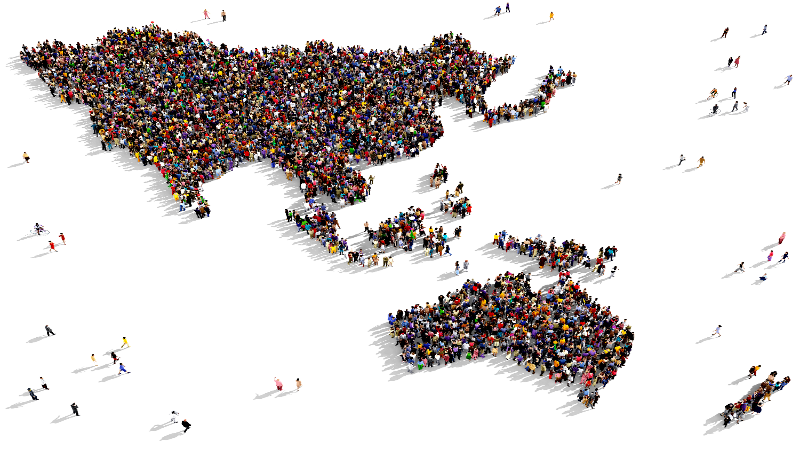Australia-China monthly wrap-up: June 2020 | Perspectives: People-to-people links: the lifeblood of the Australia-China relationship
July 03 2020

This edition features:
- Summary and analysis of major developments in June 2020 by Elena Collinson and James Laurenceson.
- Perspectives: ‘People-to-people links: the lifeblood of the Australia-China relationship’ by Peter Osborne. Perspectives is UTS:ACRI's monthly commentary series, featuring a piece on a topical subject in the Australia-China relationship from an invited expert contributor.
SUMMARY AND ANALYSIS OF MAJOR DEVELOPMENTS IN JUNE 2020
By Elena Collinson and James Laurenceson
This briefing was updated on July 8 2020.
While Australia has tended to make a concerted effort to downplay tensions with the People’s Republic of China (PRC), a shift was discernible this month as the diplomatic stalemate continues and as the PRC stepped up its unrelenting war of words. The reserves of equanimity in Australia are clearly starting to evaporate. And while senior Australian government representatives still attempt to broadly maintain moderate public rhetoric with respect to Australia’s relationship with the PRC, policy is assuming a steelier edge.
The significance of the relationship has continued to be highlighted on the Australian side, with Foreign Minister Marise Payne in an interview saying ‘a very important relationship…based on mutual respect’. Deputy Prime Minister Michael McCormack, while critical of the PRC government’s actions and assertions, also noted that ‘there’s also $149.7 billion of trade reasons why China has been a very good deal for Australian farmers, for Australia’s resources sector. It is the workers in meat processing plants at Casino, they’re the ones who hurt when we go too far in the commentary about China and the relations. We want to make sure that there’s jobs for those people.’
But there has, in parallel, been a slow drift away from public conciliation – likely exacerbated by the PRC’s apparent unwillingness to engage in dialogue, in addition to its actions. Trade Minister Simon Birmingham has continued in his efforts to open discussions with his PRC counterpart on trade tensions, but attempts to engage in dialogue on the matter have thus far been rebuffed, with the Trade Minister on June 14 stating that PRC Commerce Minister Zhong Shan had not agreed to a request for conversation. The PRC Foreign Ministry obfuscated when questioned on the matter, stating that diplomatic channels for communication were ‘unimpeded’.
On June 11 Prime Minister Scott Morrison for the first time directly cited ‘coercion’ in connection to the PRC since tensions ramped up, stating, ‘I’m never going to trade our values in response to coercion from wherever it comes’. While some senior ministers, such as Treasurer Josh Frydenberg and Foreign Minister Payne have previously deployed the term, the Prime Minister had up until now tended away from the descriptor. The Prime Minister also bluntly described the PRC’s Belt and Road Initiative as a ‘programme that the Australian foreign policy doesn’t recognise’ and ‘it is not something the Australian government has signed up to because we do not believe that it is in Australia’s national interests’. This starkly contrasts with the careful, neutral public tone he has adopted on the initiative since assuming the prime ministership.[1] The Prime Minister on June 11 also asserted that Australia had ‘done nothing to offend the relationship. Nothing at all’. He repeated the sentiment the next day – asked on June 12 how Australia would repair its Comprehensive Strategic Partnership with the PRC, he replied: ‘Australia has done nothing to injure it.’
On June 16, Marise Payne used a foreign policy address to highlight the push and promotion of disinformation during the COVID-19 pandemic, with states and other actors carrying out ‘targeted disinformation campaigns seeking to undermine democratic debate and exacerbate social polarisation, and improve their own image in the COVID-19 context’. Russia and the PRC were nominated as the primarily responsible state actors, with examples around disinformation activities notably centring solely on the PRC. The level of Australian government concern around disinformation, ostensibly with a focus on the PRC, is such that a new taskforce will soon be established in the Department of Foreign Affairs and Trade (DFAT) to combat it.
On July 1, the Prime Minister signalled a major shift in Australian strategic priorities during the launch of the 2020 Defence Strategic Update, committing $270 billion over the next decade on Australian defence capabilities. The Morrison government’s actions are consistent with a recommendation made by Nicholas Burns, a former diplomat and adviser to US Democratic presidential candidate Joe Biden’s campaign, in a speech in October 2019. He noted then that the US and its allies needed to ‘limit’ and ‘blunt’ PRC assertiveness, suggesting that an Australian contribution to this effort should ‘first and foremost’ concentrate on increasing defence spending above two percent of GDP.
In his speech marking the launch of the Update, the Prime Minister asserted ‘We’re about having the freedom to live our lives as we choose in an open and democratic liberal society, without coercion, without fear’. Despite refraining from naming the PRC outright, the Prime Minister’s remarks clearly indicate fundamental anxieties about the rise of the PRC and its intentions.
Defence Minister Linda Reynolds in a supplementary speech marking the Update appeared to smooth some of the sharper edges of the Prime Minister’s comments by underscoring the potential for cooperation with the PRC in the Indo-Pacific region:
Australia has watched closely – as China has actively sought greater influence in the Indo-Pacific. We have supported China where that pursuit advances mutual interests in security, in prosperity and in stability.
And where such actions have unsettled the stability of our region we have joined with others in clearly expressing our concerns.
…
I want to be clear. Australia remains committed to the careful management of our relationship with China. We strive for a mutually respectful, beneficial and productive relationship. One that assures the advancement of both Australia’s security and also our economic interests.
We want to work with both the United States and China – and with all other partners – to contribute to the stability and the prosperity of the entire Indo-Pacific.
But it is clear from the Update, and from both the Prime Minister and Defence Minister’s speeches, that in managing the uncertainties around the PRC that military capabilities will be elevated over and above diplomacy and foreign aid. Australia’s foreign aid budget is at an all-time low, and its diplomatic footprint is undersized, with DFAT facing more operational budget cuts.
On June 30 national security legislation giving Beijing further control over Hong Kong residents came into effect. Foreign Minister Payne expressed Australia’s ‘deep concern’ about the development, saying that ‘Australia is troubled by the law’s implications for Hong Kong’s judicial independence, and on the rights and freedoms enjoyed by the people of Hong Kong’. She noted that ‘Australia has a substantial stake in Hong Kong’s success’ and pledged to ‘work closely with likeminded countries to demonstrate Australia’s support for the people of Hong Kong’. Australia is currently considering offering ‘safe haven’ visas to Hong Kong residents, a move which would see the country effectively putting its money where its mouth is – taking substantive action that supplements rhetoric. This step, in addition to being an action that goes some way in burnishing moral credentials, would also likely be seen as effectively a challenge to the PRC, and a signal that that Australia is willing to take action counter heavy-handedness and challenges to democracy. The PRC may elect to exert its authority and act to block Hong Kong residents from taking up these visa offers. Whatever it does, it is unlikely that, given the precedent-setting nature of the current set of circumstances, Beijing will simply shrug its shoulders.
Swiftly following its imposition of an 80 percent on Australian barley exports and blacklisting of four major Australian abattoirs,[2] the PRC this month indicated a willingness to target Australia’s tourism and education sectors. The PRC Ministry of Culture and Tourism on June 5 issued an advisory warning against travel to Australia, citing ‘significant increase’ in racist attacks, while the PRC Ministry of Education on June 9 issued a statement reminding ‘all overseas students to do a risk assessment and be cautious in choosing to study in Australia or return to Australia to study’, citing ‘multiple incidents of discrimination targeting those of Asian descent’ during COVID-19. Both Trade Minister Birmingham and Immigration Minister Alan Tudge acknowledged there had been some instances of racist attacks in Australia, and condemned them as unacceptable, but asserted that Australia had been active in ‘calling them out’. The Prime Minister characterised the claims as ‘rubbish’, saying, ‘It’s a ridiculous assertion and it’s rejected’.
Equivalent warnings during tensions between the two countries in 2017 and 2018 against studying in and visiting Australia had been made by the PRC, but had at the time no discernible impact on PRC student and tourist numbers. Trade Minister Birmingham said that ‘[o]nly time will tell’ if the latest warnings would have an impact. Thus far, PRC government warnings do not appear to have impacted on its citizens’ perceptions of Australia, with Australia nominated as the second top preferred destination for tourism (following Japan) and the top preferred destination for education in a poll conducted by the Global Times and Beijing Foreign Studies University.
In a similarly curiously timed announcement as the education and travel warnings, Australian citizen Karm Gilespie, imprisoned in Guangzhou since 2014 on charges of drug smuggling, was sentenced to death on June 10 by the Guangzhou Intermediate People's Court. While Trade Minister Birmingham cautioned against linking the sentence to current tensions, noting that the PRC ‘has, over the last decade, sentenced nationals from…other nations to death and we don’t condone any of those circumstances, but nor should we read too much into this case at this time’, it is difficult not to see the case as inextricably intertwined with the circumstances. The development is reminiscent of the death sentence handed down to Canadian citizen Robert Lloyd Schellenberg in January 2019, following the arrest of Huawei senior executive Meng Wangzhou in Canada. The PRC, for its part, has also been insistent that the timing of the sentence ‘has nothing to do with the bilateral relationship’.
Australia’s foreign interference legislation, passed in 2018, looks potentially set to be substantively tested for the first time, with raids on June 26 conducted on the properties of New South Wales Labor MP Shaoquett Moselmane and his part-time staffer, John Zhang by Australian Security Intelligence Organisation (ASIO) and the Australian Federal Police, reportedly flowing on from an investigation into potential links between the MP’s office and the PRC government conducted by Australia’s counter foreign interference taskforce. A report in The Australian on December 21 last year said 'a new specialist team of investigators [within the Australian Federal Police] was preparing to move against suspected foreign agents in the first half of [2020]' has clearly come to fruition. Mr Moselmane has stated that he had been ‘informed [he was] not a suspect in this investigation. The investigation is into certain other people allegedly advancing the goals of a foreign government, namely the People’s Republic of China’.
This month saw the launch of an Inter-Parliamentary Alliance on China (IPAC), ‘an international cross-party group of legislators working towards reform on how democratic countries approach China’, comprising 19 MPs from eight countries, with Liberal backbench MP Andrew Hastie and Labor Senator Kimberley Kitching as the Australian representatives. Both hail from the self-appointed ‘Wolverines’ set in the Australian parliament, which takes an exceptionally hard-line stance against the PRC. While the Wolverines are vocal about pushback on the PRC, none of its members have as yet offered up a serious blueprint for how Australia might proceed with economic decoupling, an aim that seems to be implicit in their talking points. Two former heads of Australian intelligence on June 22 during a briefing for parliamentary Labor groups on the PRC were critical of the Wolverines, with Allan Gyngell, former head of the Office of National Assessments, characterising the group as ‘immature’. Dennis Richardson, a former head of ASIO, Foreign Affairs and Defence, said the group ‘adds no value’ to discussions on the Australia-China relationship. The Prime Minister, asked whether the Australian representation on IPAC would be helpful for the government given the current tensions with the PRC simply stated, ‘It’s a free country, it’s a free Parliament’.
In contrast to the headlines affixed to news stories, the headline trade numbers continued to hold up through April with the annual value of Australia’s goods exports to the PRC hitting a record high of $150.6 billion. But once again the overall positive result stemmed entirely from mining. In contrast, non-mining goods fell. And with the border remaining closed to international travellers, so too did indicators of services exports like tourist arrivals and student commencements.
What is important to note, however, is that weaknesses outside of mining are mostly not a PRC-specific phenomenon. This in turn reflects the fact that the COVID-19 demand shock for Australian exporters is a global one.
Preliminary trade data released this week showed that the overall resilience in Australia-China trade held up in May. There is every possibility that the PRC’s share of Australia’s exports – as opposed to the absolute dollar value – will continue to increase as the year unfolds. On June 24 the International Monetary Fund shaved another 0.2 percentage points from the PRC’s growth forecast in 2020 from 1.2 to 1.0 percent. But expectations for Japan went from -5.2 to -5.8 percent, the US from -5.9 to -8.0 percent and the European Union from -7.5 to -10.2 percent.[3] The deep complementarities between the Australian and PRC economies, as well as the PRC’s economy recovering from the COVID-19 ahead of other major sources of demand has seen the PRC’s share of Australia’s total goods exports rise from 38.1 percent in December 2019 to 38.9 percent in May 2020.[4]
Key trade indicators table - June 2020
Elena Collinson is a senior researcher at the Australia-China Relations Institute, the University of Technology Sydney.
Professor James Laurenceson is Director of the Australia-China Relations Institute at the University of Technology Sydney.
Sources
[1] See, e.g., Elena Collinson, ‘Australian perspectives on the Belt and Road Initiative’, Australia-China Relations Institute, University of Technology Sydney, October 30 2019 <https://www.australiachinarelations.org/content/australian-perspectives-belt-and-road-initiative>.
[2] Agriculture Minister David Littleproud on July 1 said that Australia had been able to ‘rectify those things that [the PRC] believe those abattoirs have done wrong’ and that ‘[w]e’re hoping they’ll come back to us in the near future and remove those temporary bans.’ See Kath Sullivan, ‘China raises the cost of Australian beef as ChAFTA safeguard is triggered’, ABC News, July 2 2020 <https://www.abc.net.au/news/2020-07-02/china-increases-tariffs-australian-beef-milk-powder/12412612>.
[3] International Monetary Fund, World Economic Outlook Update – A Crisis Like No Other, An Uncertain Recovery, June 2020 <https://www.imf.org/en/Publications/WEO/Issues/2020/06/24/WEOUpdateJune2020>.
[4] Australian Bureau of Statistics, ‘5368.0 – international trade in goods and services, Australia, May 2020’, May 7 2020 <https://www.abs.gov.au/AUSSTATS/abs@.nsf/Lookup/5368.0Main+Features1May%202020?OpenDocument>.
PERSPECTIVES | PEOPLE-TO-PEOPLE LINKS: THE LIFEBLOOD OF THE AUSTRALIA-CHINA RELATIONSHIP
Looking for a relevant opening sentence on what individuals and businesses can do to contribute to an ongoing strong, mutually beneficial relationship between Australia and the People’s Republic of China (PRC), I stumbled across a pertinent quote from Confucius on friendships:
Friends should ‘loyally admonish one another and tactfully set one another right’ and importantly friends should be dependable ‘even if the season be cold, we know that pines and cypresses are evergreen.’
At present both Australia and the PRC are certainly following Confucius’ advice and loyally admonishing each other, to put it lightly. For those of us who have been part of the Australia-China relationship for some time, we look forward to the clean scent of pine and cypress wafting on the breeze sooner, rather than later.
I do not intend to wander into that forest in this piece, but rather to give some thoughts on what we, as individuals, businesses, and organisations can do to contribute to ongoing strong ties between our countries. It is important to recognise and manage difficulties and differences in the relationship at the government level, but it is equally important not to lose sight of the value of people-to-people links, and to continue to build and nurture them.
There is a Chinese saying that ‘The man who moves a mountain begins by carrying away small stones.’ In the context of front-page headlines and the strong words, tensions, and sabre-rattling that reflects the current bilateral environment it is good to stand back and look at which small stones each one of us can move.
While at present most of our attentions are focused on the PRC, those of us who have been engaged in Asia for several decades will recall the ebb and flow, tensions and dramas of different bilateral relationships at different times. Indonesia, Thailand, Vietnam, the US, Papua New Guinea, Fiji, Malaysia, all have had their challenges, their ups and downs. Tensions are a normal part of any relationship and it is useful to take pause and remember that.
Doing business in any market, whether in Australia, or overseas, has an associated set of risks and opportunities. For the majority of Australian companies doing business with, and in, the PRC, day-to-day operational risk management is the most important, immediate, and fundamental to sales and profit growth and long-term sustainable business development. Bilateral government relationships are mostly beyond our control, but not necessarily beyond our ability to contribute in a constructive manner.
Governments, like individuals, have reputations to uphold, positions to take, ‘face’ to be given and saved. While the concept of ‘face’ is often seen as being distinctively Chinese, or at least Asian, the concepts of dignity, respect and reputation are neither Chinese nor Western. They are concepts that make good business sense and executives and officials who recognize this are the ones that are generally the most successful at an individual and organisation level.
With the current tensions between Australia and the PRC we do not need to delegate responsibility to our governments alone. Personal, company and organisation level engagement with our Chinese friends, business partners and work colleagues can play an increasingly important role to move forward. A small stone lifted.
Being Australia’s single largest trading partner means there are thousands of Australian and Chinese companies and individuals involved in our bilateral commercial, cultural and social relationships. We all have a common purpose and ambition for our businesses to continue to grow and prosper.
My challenge to each of us on the Australian side is to ensure we keep our communications open, engage with our Chinese counterparts, business partners and networks. Be constructive, be open, and systematic to make that effort. Over the past six months, how many of us reached out to our Chinese contacts to simply check in and offer support through the challenges of COVID-19? Not just to our company colleagues and business-critical contacts, but to our broader networks in the PRC? More recently, as the fires of bilateral political and economic tension have been fanned and grown, have we reached out and engaged with our Chinese counterparts or have we been reticent to do that? I would also encourage our Chinese counterparts reading this to do the same with Australian colleagues.
If there is one thing my last 30 years of dealing with the PRC has shown me is that whatever highs and lows our bilateral relationship has experienced, human connections have weathered all. In fact, support, engagement and dialogue is always respected, remembered and valued, no matter what the front-page headlines say. Indeed, as is discussed in Elena Collinson and James Laurenceson’s June overview and analysis of Australia-China relations, just last week a poll of Chinese public sentiment conducted by Beijing Foreign Studies University and PRC state-run media outlet The Global Times indicated that Australia remained a popular destination of choice for tourists and students.
When you finish reading this monthly wrap-up, set yourself a challenge. List out 10 Chinese contacts. Over the next 10 days contact one of them each day to touch base and engage. Be open about why you are reaching out. Listen to their view of their business, their challenges, their opportunities, their thoughts on the bilateral relationship. Discuss it, listen, learn, share your own views and thoughts. Take note of key points and I would encourage you to share those with your own networks, organisations and government agencies involved in our bilateral relationship.
I am sure that the team at the Australia-China Relations Institute at the University of Technology Sydney (UTS:ACRI) are also very keen to hear these thoughts and views to understand the pulse and reality of the bilateral relationship from the Australian and Chinese individuals doing business day-in, day-out, engaging in academic discourse and participating in other interrelationships, who are, in the end, the lifeblood of the bilateral relationship.
We can each lift the small stones to gradually move the mountain. If some of the stones seem a little too heavy, the words of Sun Tzu will surely add energy to our efforts:
‘There is no instance of a nation benefiting from prolonged warfare’.
Peter Osborne is Vice Chairman of the China Association for Quality Inspection and was formerly Managing Director Asia for Blackmores Limited, and Minister (Commercial) and Country Manager for Austrade at the Australian Embassy in Beijing. He is a UTS:ACRI Advisory Board member.
Authors
|
Professor James Laurenceson Director 
|
|---|
|
Elena Collinson Manager, Research Analysis 
|
|---|
|
Peter Osborne

|
|---|
